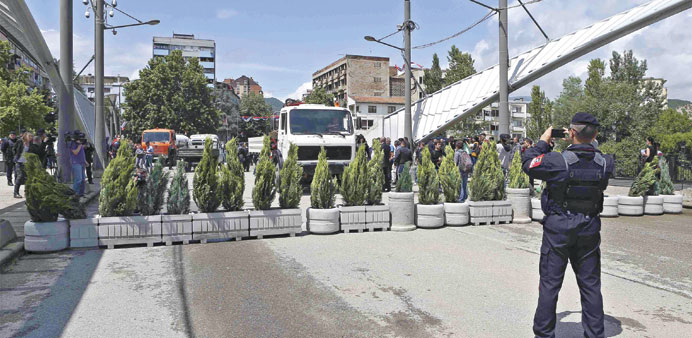A member of the MSU KFOR Carabinieri takes a picture of potted plants blocking the main bridge in Mitrovica. People brought large pots of plants to block the middle of the bridge after removing a previous barricade, calling it the ‘Peace park’ Mitrovica, divided between Serbs and Albanians on either side of the Ibar River.
AFP
A barricade that symbolised the angry refusal of ethnic Serbs in northern Kosovo to merge with the rest of the country was removed yesterday after three years, and replaced with flower boxes.
Early yesterday a bulldozer was brought in to shift the ugly pile of earth and concrete blocks that lay across the main bridge over the Ibar river in the northern flashpoint town of Mitrovica, an AFP correspondent reported.
The river separates the ethnic Albanians in the southern half of the town from ethnic Serbs in the north who largely refused to recognise Kosovo’s declaration of independence from Serbia in 2008.
For a while, traffic was moving freely across the bridge, but it was once again blocked in the afternoon when workers showed up to place a series of flower boxes and soil for small fir trees and plants.
The mayor of the town’s Serb part, Goran Rakic, said he had ordered the trees and flowers and that they represented a “peace park” aimed at calming the nerves of the local community who may have been surprised by the sudden removal of the barricade.
“We hold out a hand to our Albanian neighbours hoping that they will not interpret our gesture as a sign of weakness and that they will not abuse our trust,” Rakic said about the barricade’s removal. “Instead of being on guard forever, we believe it is better that our children play together in the park.”
It was not clear if the “peace park” would remain for long.
Not everyone welcomed the removal of the barricade, which was erected in 2011 in response to an abortive attempt by Kosovo authorities to take full control of the region.
“Now, we have no more protection,” Dragoslav Vicentijevic, a pensioner, told AFP.
Kosovo Prime Minister Hashim Thaci hailed the move, telling local media it was “further proof of the successful implementation” of an EU-brokered deal to normalise ties between Serbia and Kosovo that was signed last year.
Many of the 40,000 ethnic Serbs of north Kosovo had strongly resisted the deal, refusing to recognise the government in Pristina and accusing Belgrade of betrayal.
But left with few options, they grudgingly took part in Kosovo parliamentary elections for the first time earlier this month.
Serbia still does not recognise Kosovo’s independence but implicitly agreed to accept the Pristina government’s authority over the territory in return for the opening of EU accession talks.
There are a total of 120,000 ethnic Serbs living throughout Kosovo, a country of 1.6mn, but most are scattered in small communities away from the border.
Kosovo’s independence has been recognised by more than 100 countries, including the United States and most of the European Union’s 28 member states.

